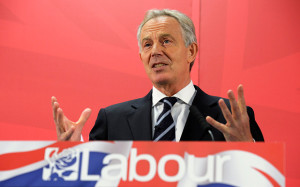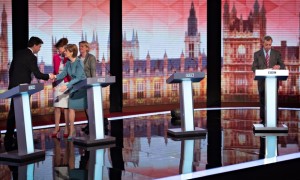Limbo is over
Sun. April 26, 2015Categories: capitalist realism, reality management
Tony Blair’s brief appearance in this election campaign, offering tepid support for a tepid Ed Miliband, ought to have been irrelevant. In many ways it was: who needs yesterday’s man, the hawker of an outmoded “modernisation”? Except, like so much of today’s culture, Blairism is obsolete but it has not yet been surpassed.
In Blair’s Castle Grey Skull, it is always 1997. Blair is like some inverted Miss Havisham, frozen not at the moment of his defeat and failure, but just before his moment of greatest success. Be cautious, don’t do anything to jeapordise the project. Blairism was this particular form of false promise, this deferral – if we are careful now, tomorrow we can do more … But tomorrow never arrives, the aim is always to be in government, the price is always the lack of any real power to change the inherited parameters of the possible. This is the formula: government without power, an increasingly unpopular populism.
The illusion of Blairism is that it was an overcoming of the defeats of the 1980s rather than their final consequence. It was a post-traumatic normalisation of catastrophe, not any sort of new dawn. Its legacy is organisational as much as ideological: a Labour Party that napalmed its grass roots (contempt for, and fear of the working class being a signature element of Blair’s rendition of populism) and which now beams down policy and PR from some rarefied Thick Of It Oxford PPE helicarrier circling miles above earth. The project remains getting into government, but without Blair’s showman-messiah charisma to cover over the vacuum beneath this aspiration. Miliband’s awkwardness stems as much from this lack of any vision as from any personal quirks. There is nothing animating the transparently choreographed moves: tack to the right on immigration, a little to the left on taxation etc. The ambition – to be the slightly lesser evil – is painfully clear to all, and can inspire no-one.
All of this is exactly what we expected… But the entry of the SNP, Plaid Cymru and the Greens into the TV debates changed the atmosphere. Suddenly, the picture the reality managers have fed us for the last few years – the three ‘big’ parties each offering a slightly different version of capitalist realism, with Farage and UKIP offering capitalist realism with even more ultra-nationalism – was interrupted, and it was possible to imagine that Britain was “headed, in its nuanced way, leftward”. In their different ways, Sturgeon, Wood and Bennett have widened the bandwidth of a media-political scene previously monopolised by the Oxbridge boys’ club. In terms of policy, there isn’t much on offer beyond a reset to social democracy (Plan B as opposed to Austerity’s Plan A), but capitalist realism is so deeply embedded that it was hard not to feel a frission when, for instance, Wood defended trade unions and the welfare state. Cameron’s refusal to appear in the BBC debate – and his banning of Clegg from doing so – was meant as a display of magisterial confidence, the only credible Prime Minister rising above the irrelevant squabbling of lowly pretenders – but it ended up further reinforcing the sense of ennui that has attended his performances this campaign. Cameron’s appeal has always depended on his ruling class ease-in-the-world, but, in his case especially, insouciance always risks shading into an appearance of diffidence and hauteur. As for the Lib Dems – as Craig Mcvegas observed, their absence was barely even acknowledged in the last debate.
Which brings us to the photograph above, analysed so well by Jonathan Jones in the Guardian. But, in addition to everything that Jones picks out, one of the most striking elements in the photograph is the empty centre. A clustering to the left, sulking Farage to the right, Cameron and Clegg – the current ‘centre’ ground – absent. Here is one picture of a post-neoliberal UK: a soft left regaining its confidence on the one hand, a glowering far right on the other, nothing where the capitalist realist ‘middle’ used to be. (Whether Farage will be the figure around which this right will coalesce is now open to serious doubt – with it looking as if he is unlikely to win South Thanet, it might be that his moment as the people’s stockbloker is already over. The ominous question is: if Farage falls, which right wing demagogue will emerge to take his place?)
The SNP-Labour coalition is far more than we could have hoped a few weeks ago, but it is far from enough. How have we settled for so little? asked an incendiary Russell Brand at the screening of his and Michael Winterbottom’s The Emperor’s New Clothes in Hackney this week. For those hipster priests who wish to keep activism a marginal pursuit, Brand’s fame and wealth automatically exclude him from being taken seriously. Yet fame, charisma and money are resources, and the left badly needs to be associated with glamour instead of moralising asceticism. Watching the film in a cinema alongside so many of those who feature in it – campaigners from the New Era estate, striking careworkers, fire-fighters – was moving, humbling, electrifying. The Free Association have been doing some interesting work on why comedy has replaced music as a political force. Now, much more than any contemporary musician, it is Brand who embodies the psychedelic-Promethean principle that any given reality is provisional, plastic, subject to transformation by collective action. I love crowds … Brand functions as a figure of identification who intensifies and links together already existing struggles, and incites us to breach the invisible thresholds that lock us into atomised impotence. We can do what we want… Having passed through what on Tuesday he memorably called the “fame paddock” of contemporary celebrity, Brand is now in a practically unique position. Instead of remaining in the condition of hedonic melancholia typical of those with unlimited access to late capitalism’s pleasure gardens, he’s come out the other side, laughing his trickster laugh, with more resources and an invaluable insider-knowledge of how the media machine constructs what counts as reality. His gleeful performance of de-subordination reminds us of the countercultural lesson: if you gain money and success, there’s only one thing to do with the hand that feeds you, and that’s bite it.
In many ways, The Emperor’s New Clothes tells us what we already know, but this is the point. How can we accept what we know, when what we know is so monstrous, so obscene, so insane? In the Q and A, Brand was asked why people care more about the X Factor than political struggles. But he argued that, rather than decrying the X Factor, its techniques – in particular those which incite emotion – need to be repurposed. “Capitalism has given us the organisms and the machines we can use to produce the revolution”. #accelerate! So the film is an exercise in affective engineering which patiently yet relentlessly dismantles capitalist realist commonsense. One of its most powerful techniques is the use of simple but devastating contrasts: cleaners at RBS earning hundreds of times less than the bosses(same physical space, different worlds); rioters jailed for stealing small items next to bankers who caused social catastrophe not only going unpunished but receiving bonuses. Mark Kermode’s accusation that the film is “simplistic” misses the point. When faced with a media machine that pushes an outrageously simplistic story of its own – it was Labour wot done it – while recounting neoliberal catechisms like Medieval Catholic priests reciting the Mass in Latin, we need an equally simple counter-narrative.
It’s hard not to have some sympathy with Brand’s disdain for voting, which is part of a widespread disillusion with the massively circumscribed conditions of electoral politics under capitalist realism, in which the best that can be hoped for is the least worst. But the problem is that popular disengagement from parliamentary politics suits the right more than us. The right doesn’t need the enthusiasm that Thatcher could call upon from certain portions of the population; it doesn’t need legitimacy. Popular disengagement, ambient despair, the sense that nothing is at stake in elections, is in the interests of capital, now that all the defaults have been set to neoliberal options. Of course, there was no golden age of parliamentary democracy any more than there was a golden age of the Labour Party; there was no point at which progressive achievements were entirely free of compromise and corruption. But the progressive function of parliamentary politics has been to put some limits on tyranny. Capitalist realism has meant the tacit but definite acceptance that corporate tyranny cannot be curbed, resulting in the democratic deficit that Aditya Chakrabortty described so vividly the other day:
democratic leaders have parted ways with their voters – literally. Membership of the main parties has dropped sharply over the past three decades, so that there are now more vegans in Britain than members of the Conservative party. What’s replaced mass democracy is big donors and a professional political elite. It no longer pays for politicians to think hard about fair growth or build more houses, because to do so would antagonise the big corporates or the big media, or deter those middle-class and retired voters who actually do turn out to the polling stations.
The phobic panic that the prospect of a Labour-SNP coalition is provoking indicates that capital fears any reversal, no matter how modest, of this situation. It has grown used to having everything its own way – but this has led to a certain decadence, an exhaustion of thinking and of strategy. It is surely this exhaustion, as much as any desperation, which accounts for the ludicrous, beyond-satire poking about in Ed Miliband’s anodyne love life, or the scarcely believable attempts to discredit Nicola Sturgeon.
Sturgeon poses a threat, not merely because of her lawyerly poise in debate, not merely because she has articulated an anti-austerity position, nor even because she makes Scottish independence more likely, but more because she has a mobilised base of support behind her. In Scotland, as in Greece and Spain, new models of political organisation, new “logics of proliferation” are emerging and being experimented with. Rather than compulsively repeating the same strategies, rather than dogmatically insisting on the inherent futility of elections, these developments are part of a process of collective learning about how popular movements can be (re)connected with parliamentary politics. The potential power of such strategies is clear. The electoral impasse is not down to some semiotic failure (if only we had the right PR initiative to engage the kids!), but reflects the actual composition of forces in society. Capitalist realism is class war fought by one side only, an organised corporate elite which is very clear about what its own class interests are and what must be done to keep things aligned with those interests. Only a mobilised population can give political parties the power to challenge corporate tyranny. As Keir Milburn says in an important piece, and, as the situation in Greece is showing, you can’t vote out neoliberalism. But as Keir also argues, “[e]ven at their point of failure Plan B electoral politics can be useful if they can clarify the anti-democratic effects of neoliberalism that work against all forms of collective action.”
In the UK, this could be the most important election since 1979. Even the most sentimental pipedreamer couldn’t imagine the Labour Party will be returning to Plan B socialism in the immediate future, still less offering something more modern and radical. Yet it’s perfectly plausible that a Labour-SNP coalition could now achieve what Jeremy Gilbert and I argue that New Labour could have been expected to attempt: “make some efforts to change the strategic situation in the long-term: to rebuild the unions, to re-energise local government, to facilitate the growth of an alternative media sector”. For even this to happen, it will be necessary for those in the party who really want to break with capitalist realism – and, believe it or not, there are such people – to seize the initiative. What is the alternative for Labour? Even the lacklustre and affectless brand of politics that the party have served up under Miliband so far won’t be sustainable for much longer. Entropy might be the best fate a Labour Party which can’t grasp the new mood can hope for; the more likely scenario is a PASOK-like disintegration. In any case, there’s no way back to the pre-2008 world, no way back to capitalist realism with a joker-hysterical face. The party needs really to register that Blairites – and the residual Blairite atmosphere in a demoralised and disconnected Labour party – are as out of date now as Blair argued “Old Labour” was in 1997. Now, more than ever, there are no guarantees. The road to renewal has never seemed harder, or longer. Yet, as Margarita Tsomou said in an important intervention at the Monopol aug Morgen event in Vienna last week, limbo is now over. Are we plunging deeper into nihiliberal dystopia – the ultra-rich retreating into compounds, a vast “surplus population” abandoned to fight amongst itself, and subdued by a militarised Hunger Games-style police force? Or is a new popular leftism about to begin the escape from capitalist realism?



